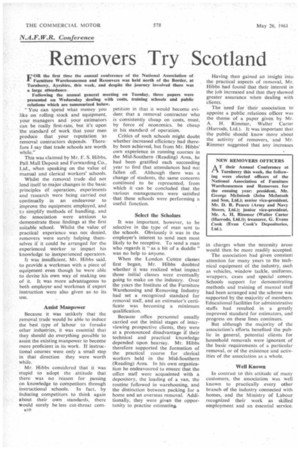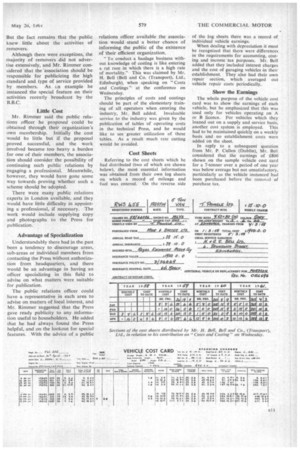N.A.F.W.R. Conference
Page 44

Page 45

If you've noticed an error in this article please click here to report it so we can fix it.
Removers Try Scotland
OR the first time the annual conference of the National Association of Furniture Warehousemen and Removers was held north of the Border, at Turnberry, Ayrshire, this week, and despite the journey involved there was a large attendance, Following the annual general meeting on Tuesday, three papers were presented on Wednesday dealing with costs, training schools and public relations which are summarized below,
"You can Spend what money you like on rolling stock and equipment, your managers and your estimators can be really first-rate, but it's upon the standard of work that your men produce that your reputation as removal contractors depends. Therefore I say that trade schools are worth while."
This was claimed by Mr. F. S. Hibbs, Pall Mall De posit and Forwarding Co., Ltd., when speaking on the value of manual and clerical workers' schools.
Whilst the removal trade did not lend itself to major changes in the basic principles cif operation, experiments and research were being carried out continually in an endeavour to improve the equipment employed, and to simplify methods of handling, and the association were anxious to demonstrate these findings at the first suitable school. Whilst the value of practical experience was not denied. removers were surely helping themselves if it could be arranged for the experienced worker to impart his knowledge to inexperienced operators.
It was insufficient, Mr. Hibbs said, to provide a workman with a piece of equipment even though he were able to devise his own way of making use of it. It was more advantageous to both employer and workman if expert instruction were also given as to its use.
Assist Manpower
Because it was unlikely that the removal trade would be able to induce the best type of labour to forsake other industries, it was essential that they should do everything possible to assist the existing manpower to become more proficient in its work. If instructional courses were only a small step in that direction they were worth while.
Mr. Hibbs considered that it was stupid to adopt the attitude that there was no reason for passing on knowledge to competitors through instructional schools. In fact, by inducing competitors to think again about their own standards, there would surely be less cut-throat corn
at 0
petition in that it wouldbecome evident that a removal contractor who is consistently cheap on costs, must, by force of economics. be cheap in his standard of operation.
Critics of such schools might doubt whether increased efficiency had thereby been achieved, but from Mr. Hibbs' own experience in running courses in the Mid-Southern (Reading) Area, he had been gratified each succeeding year to find that attendances had not fallen off. Although there was a change of students, the same concerns continued to be represented, from which it can be concluded that the various managements were satisfied that these schools were performing a useful function.
Select the Scholars It was important, however, to be selective in the type of man sent to the schools. Obviously it was in the employer's interest to send men most likely to be receptive. To send a man who regards it "as a bit of a doddle " was no help to anyone.
When the London Centre classes first began, Mr. Hibbs doubted whether it was realized what impact those initial classes were eventually going to make on the industry. Over the years the Institute of the Furniture Warehousing and Removing Industry had set a recognized standard for removal staff, and an estimator's certificate was becoming a minimum qualification.
Because office personnel usually carried out the initial stages of interviewing prospective clients, they were at a pronounced disadvantage if their technical and practical knowledge depended upon hearsay. Mr. Hibbs therefore supported the formation of the practical course for clerical workers held in the Mid-Southern (Reading) Area. In his own organization he endeavoured to ensure that the office staff were acquainted with a depository, the loading of a van, the routine followed in warehousing, and the distinction between packing for a home and an overseas removal. Additionally, they were given the opportunity to practise estimating. Having then gained an insight into the practical aspects of removal, Mr. Hibbs had found that their interest in the job increased and that they showed greater assurance when dealing with clients.
The need for their association to appoint a public.relations officer was the theme of a paper given by Mr. A. H. Rimmer, •Waiter Carter (Harrods, Ltd.). It was important that the public should know more about the activity of removers, and Mr. Rimmer suggested that any increases
in charges when the necessity arose would then be more readily accepted.
The association had given constant attention for many years to the technical equipment of the industry, such as vehicles, window tackle, uniforms, wrappers, cases and special covers. Schools support for demonstrating methods and training of manual staff had been arranged and the scheme was supported by the majority of members. Educational facilities for administrative staffs had resulted in a greatly improved standard for estimators, and progress on these lines continues.
But although the majority of the association's efforts benefited the public in genera!, potential clients for household removals were ignorant of the basic requirements of a particular removal, or of the existence and activities of the association as a whole.
Well Known In contrast to this attitude of many customers, the association was well known to practically every other branch of the industry connected with homes, and the Ministry of Labour recognized their work as skilled employment and an essential service.
But the fact remains that the public knew little about the activities of removers.
Although there were exceptions, the majority of removers did not advertise extensively, and Mr. Rimmer considered that the association should be responsible for publicizing the high standard and type of service provided by members. As r..n example he instanced the special feature on their activities recently broadcast by the B.B.C.
Little Cost Mr. Rimmer said the public relations officer he proposed could be obtained through their organization's own membership. Initially the cost would be little but if the proposal proved successful, and the work involved became too heavy a burden for one of their members, the association should consider the possibility of continuing such public relations by engaging a professional. Meanwhile, however, they would have gone some way towards proving whether such a scheme should be adopted.
There were many public relations experts in London available, and they would have little difficulty in appointing a professional, if necessary. The work would include supplying copy and photographs to the Press for Publication.
Advantage of Specialization Understandably there had in the past been a tendency to discourage areas, sub-areas or individual members from contacting the Press without authorization from headquarters, and there would be an advantage in having an officer specializing in this field to advise on what matters were suitable for publication.
The public relations officer could have a representative in each area to advise on matters of local interest, and Mr. Rimmer suggested that the Press gave ready publicity to any information useful to householders. He added that he had always found the Press helpful, and on the lookout for special features. With the advice of a public relations officer available the association would stand a better chance of informing the public of the existence of their efficient organization.
"To conduct a haulage business without knowledge of costing is like entering a rat race in which there is a high rate of mortality." This was claimed by Mr. H. Bell (Bell and Co. (Transport), Ltd., Edinburgh), when speaking on "Costs and Costings" at the conference on Wednesday.
The principles of costs and castings should be part of the elementary training of all operators when entering the industry, Mr. Bell added. Invaluable service to the industry was given by the publication of tables of operating costs in the technical Press, and he would like to see 'greater utilization of these tables. As a result much rate cutting would be avoided.
Cost Sheets Referring to the cost sheets which he had distributed (two of which are shown below), the most essential information was obtained from their own tog sheets on which a record of mileage and fuel was entered. On the reverse side
of the log sheets there was a record of individual vehicle earnings.
When dealing with depreciation it must be recognized that there were differences in the requirements for accounting, costing and income tax purposes. Mr. Bell added that they included interest charges and the cost of garaging vehicles in their establishment. They also had their own repair section, which averaged out vehicle repair costs periodically.
• Show the Earnings The whole purpose of the vehicle cost card was to show the earnings of each vehicle, but he emphasized that this was used only for vehicles operating on A or B licence. For vehicles which they loaned out on a supply and service basis, another cost system is employed. This had to be maintained quickly on a weekly basis and no establishment costs were added on the sheet.
In reply to a subsequent question from Mr. P. Cullen (Dublin), Mr. Bell considered that the earnings of 1800 shown on the sample vehicle cost card for a 7-tonner over a period of one year was below average but not unsatisfactory, particularly as the vehicle instanced had been purchased before the removal of purchase tax.




















































































































